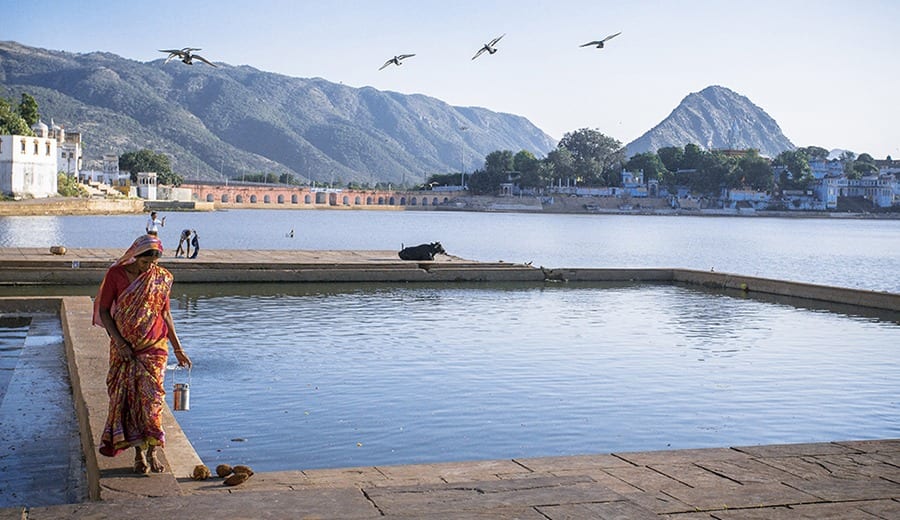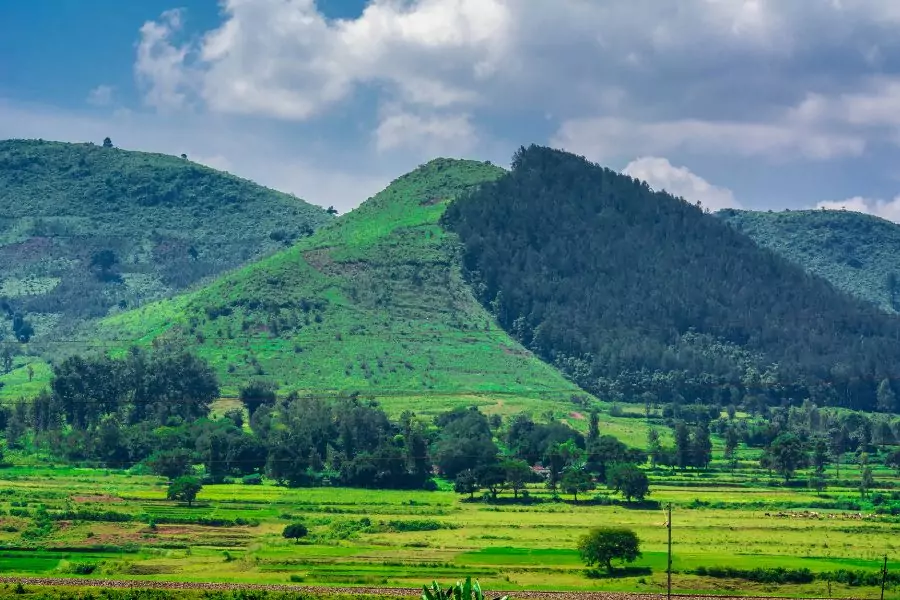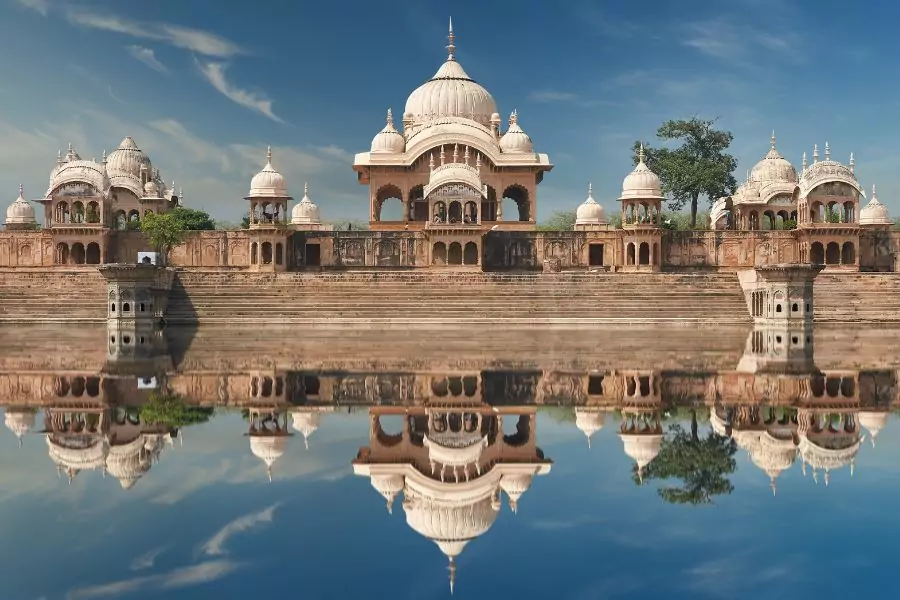Pushkar Lake
Things to see near Pushkar Lake
Pushkar Lake is a sacrosanct lake of Tirtha Raj (King of all consecrated Hindu spots) Pushkar in Rajasthan. Otherwise called Pushkar Sarovar is joined by just about 500 sanctuaries and 52 showering ghats. Amid the fight with the evil spirit Vajra Nasha/Vajra Nabha, petals from Lord Brahma’s lotus fallen on three spots. Those spots are the fundamental Pushkar Lake i.e. Jyeshtha Pushkar, Madhya Pushkar, and KanishthaPushkar. Encompassed by Ratnagiri, Nilgiri, Sachoora, and Suryagiri slopes of Aravali Mountain run, the lake is incredibly excellent.
Pushkar town has developed around the lake. 52 consecrated washing ghats of the lake include ornamented excellence and accommodation for the pioneers.
The path between the lake and the considerable Brahma temple is an astounding Pushkar advertisement. Improved shops of craftsmanship and artworks, weapons, restaurants, and fabrics are astounding shopping spots.
Attractions near Pushkar Lake
- Pushkar Lake is a standout amongst the most worshipped locales in Rajasthan and home to the main Brahma Temple of the World. Likewise, the lake gets swarmed amid different celebrations and the well-known Pushkar Camel Fair.
- Temples near The Lake: There are around 500 temples situated at the shore of the lake of which many were crushed amid the Mughal management in India. The most vital of these is the Brahma Temple which is accepted to be around 2000 years of age; however, the design is of 114th century.
- Ghats at Pushkar Lake: There are around 52 ghats at the lake which is utilized by pilgrims to scrub down. Be that as it may, 10 of these are most celebrated and are critical recorded engineering as well. These are the Dadhivh Ghat, Varaha Gat, Gwalior Ghat, Saptarishi Ghats, Gau Ghat, Kota Gat, YagGhat, Jaipur Ghat, Gangaur Ghat, and Karni Ghat.
- Pushkar Fair: Pushkar Camel Fair is Asia’s biggest camel fair which initiates on Prabodhini Ekadashi, the eleventh lunar day in the brilliant fortnight and closures on Kartik Poornima – the full Moon day in the long stretch of Kartik (October– November). The lake turns out to be excessively swarmed amid this time as it is said that scrubbing down on Kartik Poornima is extremely ecstatic and washes away all your sins.
- Naga Pahar: Pushkar and Ajmer are isolated by a slope — known as Naga Pahar. According to the legends, the slopes at Naga Pahar keep on diminishing till date and will inevitably vanish completely. These slopes are accepted to be the home of the celebrated Sage Agastya. The slopes additionally house a lake called Nag Kund. Naga Pahar offers a terrific perspective of Pushkar city from its best and has frequently been utilized as a vantage point for picture-takers.
- Rose garden: Pushkar is additionally known for its rose cultivation. It alludes as the Rose Garden of Rajasthan. The ranchers, here, develop climbed widely and the decent varieties of this bloom become here, are sent out everywhere throughout the world. There are sections of land of ranch lands with delightful red roses in various shades spreading the aroma — sufficiently charming to influence one to ache for to sit and invest some beautiful time.
History of Pushkar Lake
The historical backdrop of Pushkar Lake goes back to the fourth Century BC. Despite the fact that the formation of Pushkar Lake as a counterfeit lake began in the twelfth century when a dam was worked over the Luni waterway. Master Govind Singh is said to have given hallowed discourse of the Guru Granth Sahib at the Bank of the Lake.
The Rajput leaders of Amber, Bundi, Bikaner, and Jaisalmer tried awesome endeavors to re-establish the significance of the lake and its encompassing temples. After that numerous rulers of the Different territories constructed ghats over the lake.
Pushkar Lake How to reach
Pushkar Lake is located in the city of Pushkar in the Indian state of Rajasthan. To reach Pushkar Lake, you can:
- By Air: The nearest airport is the Sanganer Airport in Jaipur, which is about 140 km from Pushkar.
- By Rail: The nearest railway station is the Ajmer Railway Station, which is about 11 km from Pushkar.
- By Road: Pushkar is well connected by road and there are regular bus services from cities such as Jaipur, Ajmer, and Delhi to Pushkar. You can also hire a taxi or drive to Pushkar.
Best time to visit
The best time to visit Pushkar Lake is from October to March. During this time, the weather is pleasant and suitable for sightseeing and other activities. The temperature ranges from 10°C to 25°C, making it ideal for outdoor activities. Additionally, the Pushkar Camel Fair, one of the largest livestock fairs in the world, takes place in November, making it an exciting time to visit Pushkar. The monsoon season in Pushkar is from July to September and the summer months can be quite hot, so these may not be the most ideal times to visit.
Things to do
There are several interesting things to do when visiting Pushkar Lake:
- Take a dip in the lake: Pushkar Lake is considered to be sacred by Hindus and taking a dip in the lake is believed to cleanse the soul and absolve sins.
- Visit the Pushkar Camel Fair: The Pushkar Camel Fair is a must-visit for those interested in traditional rural Indian culture and commerce.
- Explore the temples: Pushkar has several ancient temples, including the Brahma Temple which is one of the few in the world dedicated to Lord Brahma, the Hindu god of creation.
- Shop for souvenirs: Pushkar is famous for its colorful bazaars and you can find a variety of items such as textiles, jewelry, and handicrafts.
- Try traditional Rajasthani cuisine: Pushkar offers a range of local cuisine including spicy curries, breads, and sweets.
- Visit the Pushkar Sarovar: This is a large tank adjacent to the lake that is considered to be sacred.
- Take a hot air balloon ride:



